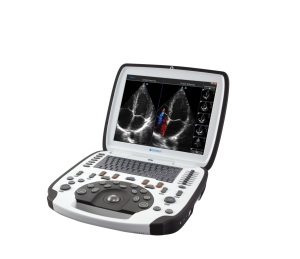by
John R. Fischer, Senior Reporter | August 22, 2019

Terason is integrating DiA AI
technology into its point-of-care
ultrasounds, like Terason 3300
Ultrasound imaging provider Terason will integrate the cardiac AI technology of DiA Imaging Analysis into its point-of-care ultrasound solutions to equip providers with access to more accurate and objective imaging assessments.
The partnership aims to provide users of the Terason uSmart 3200T NexGen and Terason uSmart 3300 NexGen with Dia's LVivo EF and LVivo Strain technology for greater image clarity to aid in decision-making and reduce subjectivity in analyses.
“LVivo EF, Left Ventricle Ejection Fraction, represents the most frequent indication for an Echo study and is pivotal for patient evaluation, management and as an indicator for treatment initiation or suitability for device implantation in heart failure,” Dr. Alice Chiang, Terason's CEO and founder, told HCB News. “Dia-Analysis’ auto-EF software provides a fully automated selection of apical 4- and 2-chamber views with calculation of Bi-plane EF. Reproducibility is great and drastically reduces the data-analyzing time.”



Ad Statistics
Times Displayed: 72328
Times Visited: 2375 Ampronix, a Top Master Distributor for Sony Medical, provides Sales, Service & Exchanges for Sony Surgical Displays, Printers, & More. Rely on Us for Expert Support Tailored to Your Needs. Email info@ampronix.com or Call 949-273-8000 for Premier Pricing.
Relying on pattern recognition, the machine and deep learning technologies of DiA can identify and generate fast, quantitative and objective findings of cardiac functions and abnormalities. LVivo EF, for instance, provides users with a visual estimate of ejection fraction, the evaluation of which often varies based on experience. It also depicts an error message to signify if an image is not taken correctly, a feature that was
shown at the 2018 Radiological Society of North America annual meeting.
Terason’s point-of-care ultrasound solutions are designed for ultrasound-guided venous intervention, enabling users to identify and treat a wide range of pathologies in the fields of cardiology, vascular surgery, interventional radiology, endocrinology, nephrology, the study of the musculoskeletal system, and breast surgery, among others. Institutions that have adopted its technology include
Henry Schein and
Virginia Tech Carilion School of Medicine.
"Millions of ultrasound scans are done each day. Yet, their acquisition and analysis are done visually. AI assists in reducing the variability associated with visual acquiring and analysis by generating objective real-time data for clinical indications that ultrasound users could be based on when managing patients," Hila Goldman-Aslan, DiA’s CEO and co-founder, told HCB News. "Using AI could assist improving patients care by supporting clinician’s decisions on the premise."
Back to HCB News

